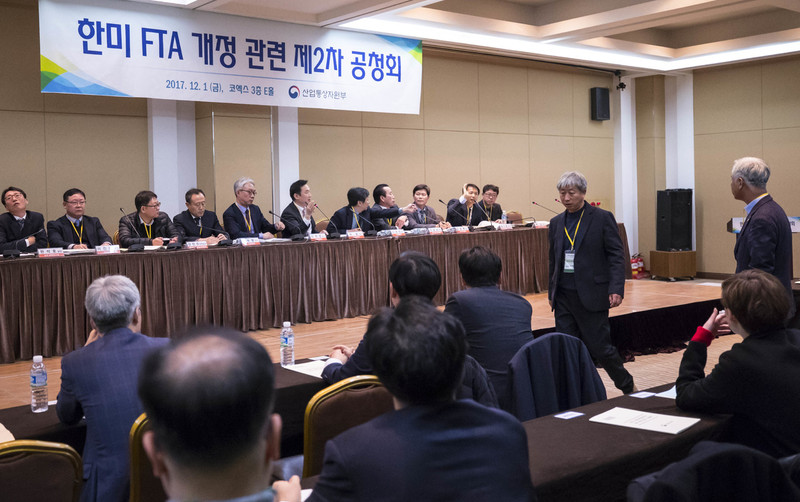 |
|
The second public hearing about revising the South Korea-US Free Trade Agreement commences at the COEX building in the Gangnam District of Seoul on Dec. 1. (Yonhap News)
|
Agriculture and livestock industries are pushing the government to withdraw from the agreement
During the second public hearing about revising the South Korea-US Free Trade Agreement (known as the KORUS-FTA), which was held on Dec. 1, multiple experts and discussants asserted that South Korea must be prepared to scrap the entire agreement. The agriculture and livestock industries, which have been seriously harmed by the KORUS-FTA, have long been pushing for South Korea to withdraw from the agreement. “We will pay heed to the concerns of stakeholders in all sectors, since every one of them is important to us,” said Kang Sung-chun, Deputy Minister of Trade. “We should approach these negotiations at a time of our choosing, according to our procedures, and in line with our needs and objectives, instead of being dragged around by the Trump administration,” said Song Gi-ho, an attorney with MINBYUN-Lawyers for a Democratic Society, during the hearing, which was held at COEX in Seoul’s Gangnam District. Baek Il, a professor at Ulsan College, went a step further. “Even declaring that we’re walking away from the agreement would not be to our disadvantage. Our attitude should be that we’re perfectly willing for the agreement to end. We have virtually no economic interest in sustaining an agreement if that means making concessions on our main products,” Baek said. “The FTA revision negotiations are a penalty kick for the US, where the US is on the offensive and South Korea can only defend,” said Park Hyeong-dae, chair of the policy committee for the Korean Peasants League, who is opposed to holding the negotiations at all. Yu Myeong-hui, director general of the Trade Policy Bureau for the Ministry, responded to calls for withdrawing from the agreement by promising to “ask for changes that can maximize our national interest on a level that is commensurate to what the US is asking for. The assessment of the Korea Institute for International Economic Policy suggests that the US would lose out if the agreement were scrapped.” In September, the institute said that its analysis of the scenario in which the agreement is terminated showed that the US would suffer a greater drop in exports in the manufacturing and farming sectors. “During the negotiations, the US may ask for more liberalization of the agricultural sector and for the relaxation of the rules of origin for automobiles, steel and agriculture products. It might even ask for the 2.5% automobile import tariff that was abolished in Jan. 2016 to be reinstated and extended for eight years,” said Lee Dong-bok, the director of trade research at the Korea International Trade Association, who was another discussant at the hearing. “It would be advisable for us to adopt the strategy of neither accepting nor requesting a reversal of tariffs in the manufacturing commodities sector,” said Lee Jin-myeon, head of the Center for Industry Statistics Analysis at the Korea Institute for Industrial Economics and Trade. This hearing marks the end of the Ministry’s efforts to gather opinions about the negotiations. It will now work on a plan for concluding trade agreements that will include a strategy for the negotiations and then brief the National Assembly on that plan before the end of that month. That briefing will conclude the procedures mandated by South Korean law for initiating such negotiations. The official announcement of the commencement of negotiations will probably be made at the end of the year or in January. By Cho Kye-wan and Choi Ha-yan, staff reporters Please direct questions or comments to [english@hani.co.kr]






